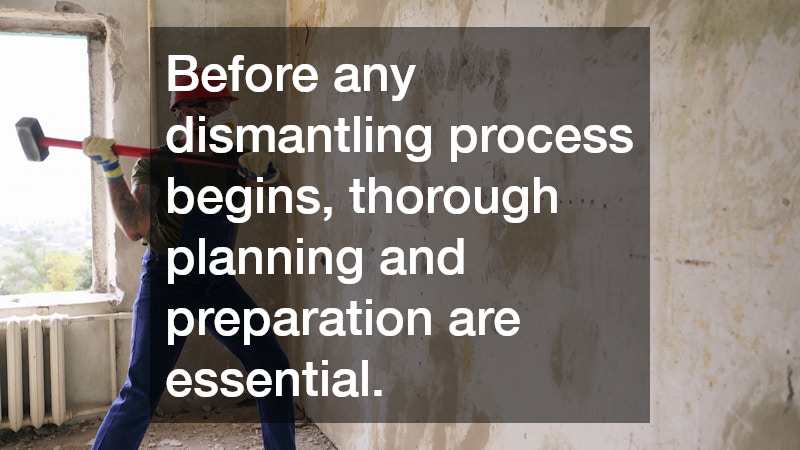
Industrial dismantling involves the systematic deconstruction of industrial structures and equipment. This process is essential for making way for new developments or repurposing industrial sites. Due to the complexities involved, it requires meticulous planning and skilled execution.
The success and safety of industrial dismantling projects hinge on a deep understanding of the structures being dismantled. Experts bring their knowledge of engineering, materials, and project management to the forefront. Their expertise ensures that each step is taken with precision to avoid unforeseen complications.
Additionally, experts utilize advanced technology to identify structural vulnerabilities. This technological insight is crucial in developing effective dismantling strategies that protect both the crew and the environment. Ultimately, industrial dismantling is a complex yet vital process driven by the expertise of skilled professionals.
Planning and Preparation
Before any dismantling process begins, thorough planning and preparation are essential. Experts conduct detailed site assessments to understand the scope and risks associated with the project. These assessments involve structural analysis, equipment inspections, and environmental studies.
Based on these assessments, a comprehensive dismantling plan is developed. This plan outlines the sequence of dismantling activities, safety protocols, and required resources. Effective planning ensures that the dismantling process proceeds smoothly and safely.
In addition to technical assessments, experts consider logistical elements such as transportation and waste management. By addressing these factors in the preparation phase, professionals reduce the likelihood of project delays and hazards. Preparation is a cornerstone of successful dismantling projects.
Safety Protocols and Training
Safety is an uncompromising priority in industrial dismantling. Experts establish rigorous safety protocols to protect both workers and the environment. These protocols are designed to mitigate potential hazards such as falling debris, exposure to hazardous materials, and equipment malfunctions.
In addition to implementing safety protocols, training is a critical component of ensuring safe dismantling. Workers undergo specialized training programs to familiarize themselves with safety practices and risk management strategies. This training empowers workers to perform their duties confidently and safely.
Furthermore, experts conduct regular safety drills to reinforce protocol adherence and emergency response skills. By maintaining high safety standards, professionals uphold the integrity of industrial dismantling and safeguard those involved. Safety training and protocol enforcement are non-negotiable in this demanding field.
Technological Advancements in Dismantling
The advancement of technology has revolutionized the industrial dismantling sector. Experts leverage innovative tools and methods to improve efficiency and safety. Innovations such as remote-controlled equipment and drones allow for safer inspection and deconstruction of hazardous areas.
Additionally, 3D modeling and simulation software enable experts to plan and visualize dismantling projects with unprecedented accuracy. These technologies help identify challenges and optimize strategies before physical work begins. This foresight minimizes risks and enhances project timelines.
Furthermore, advanced monitoring systems provide real-time data on structural stability and environmental conditions. By integrating these technologies, experts ensure precise control and response during dismantling operations. Technological advancements continue to drive improvements in dismantling methodologies.
Challenges in Industrial Dismantling
Despite meticulous planning, industrial dismantling presents numerous challenges. One of the primary obstacles is handling hazardous materials such as asbestos and chemical residues. Experts employ specialized techniques and equipment to safely manage and dispose of these materials.
Additionally, navigating logistical constraints such as limited access or confined spaces can complicate dismantling efforts. Experts devise innovative solutions to overcome these barriers, ensuring the project remains on track. Their ability to adapt to unforeseen challenges is key to successful dismantling.
Furthermore, experts must maintain strict adherence to regulatory requirements, which can vary significantly between regions. Compliance with these regulations is crucial to avoid legal and financial repercussions. The complexity of industrial dismantling calls for experts who can navigate these multifaceted challenges with skill and foresight.
Environmentally Responsible Dismantling
Environmental responsibility is a critical aspect of modern dismantling projects. Experts prioritize eco-friendly practices to minimize the impact on surrounding ecosystems. This includes strategies such as recycling materials, reducing emissions, and safeguarding local wildlife.
By employing sustainable methodologies, experts contribute to the preservation of natural resources and biodiversity. They also implement waste management practices that emphasize reduction, reuse, and recycling. These efforts ensure that dismantling projects align with environmental principles.
Furthermore, environmental impact assessments guide experts in making informed decisions that protect the environment. These assessments identify potential ecological risks and inform strategies for their mitigation. By integrating environmental considerations into dismantling projects, professionals foster a sustainable future.
In conclusion, safe industrial dismantling relies on the expertise of skilled professionals who bring technical knowledge, safety protocols, and innovative technology to the process. Their meticulous planning, rigorous training, and environmental stewardship ensure that dismantling projects are executed efficiently and responsibly. The complexities of industrial dismantling demand experts who can navigate challenges and uphold the highest standards of safety and sustainability.
As industries evolve and infrastructure needs change, the role of dismantling experts becomes increasingly vital. Their ability to identify risks, optimize processes, and integrate new technology contributes to the seamless transition from old to new. In the realm of industrial dismantling, expertise is not just beneficial; it is indispensable.
By staying abreast of advancements and maintaining a commitment to safety and environmental responsibility, experts play a pivotal role in shaping the future of industrial development. Their dedication ensures that dismantling is not merely about deconstruction but about paving the way for progress in a safe and sustainable manner. Ultimately, the efforts of these professionals drive positive change within the industrial landscape.




